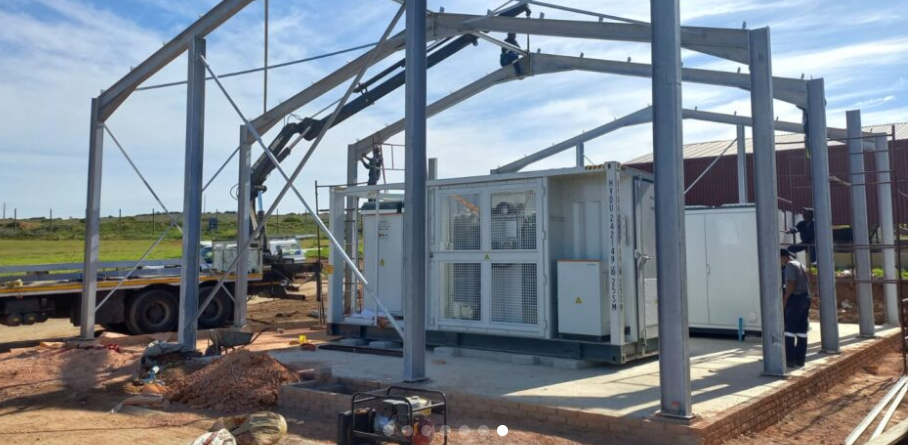By Johnathan Paoli
The Mossel Bay Municipality has officially unveiled its R112 million Hartenbos Wastewater Treatment Works (WWTW) solar photovoltaic (PV) plant and hybrid micro-grid system, a first-of-its-kind municipal energy resilience project in the Garden Route, designed to safeguard critical infrastructure against power disruptions and loadshedding up to Stage 6.
At the ribbon-cutting ceremony last week, municipal manager Colin Puren hailed the project as a cornerstone in Mossel Bay’s long-term vision for resilience and sustainability.
“As a municipal manager, I am proud to say that we are one step closer to making our city and our town sustainable,” Puren said.
Mossel Bay mayor Dirk Kotze highlighted the strategic foresight behind the investment, citing the volatility of Eskom’s power supply and rising electricity prices as key motivations.
“We all know the history of Eskom and energy prices in South Africa. The Mossel Bay council decided to start investing in energy sustainability. This project means that our bulk infrastructure will be able to cope with extended periods of loadshedding,” Kotze explained.
Developed in partnership with Solareff and Element Consulting Engineers, the project marks a milestone in the municipality’s broader clean energy transition.
The system integrates solar power generation, battery energy storage, and diesel backup into a fully automated micro-grid capable of seamless switching between energy sources to ensure uninterrupted operations at the wastewater facility.
Spanning 3.5 hectares of municipal land north of the R102 and N2, the installation combines 4,536 PV panels generating 2.112 MVA, supported by a Battery Energy Storage System (BESS) rated at 2.75 MVA and a generator farm with 1.6 MVA capacity.
The PV inverter station has a capacity of 3.2 MVA, while a newly constructed substation featuring 11 kV switchgear and control systems enables seamless switching between solar, battery, and diesel power.
Under normal conditions, the micro-grid operates in parallel with the Eskom supply.
During grid outages, the BESS automatically takes over, drawing on stored energy generated during daylight hours.
Diesel generators serve as a tertiary backup to maintain continuous treatment operations, an essential safeguard for environmental protection and public health.
Crucially, the system is also grid-tied, allowing excess solar energy to be exported back into the municipal grid during off-peak times.
This not only offsets the town’s electricity costs but also contributes to local grid stability and decarbonisation efforts.
Construction began in April 2024, with Solareff serving as the engineering, procurement, and construction (EPC) contractor and Element Consulting Engineers overseeing the electrical design and integration.
Ground was officially broken in November last year, and practical completion was achieved at the end of September 2025 following final testing and commissioning.
For Solareff’s Chief Commercial Officer DeVilliers Botha, the project demonstrates how decentralised energy systems can reinforce South Africa’s fragile transmission grid.
“You often hear that we need to expand the transmission grid to deliver power across the country. But if we install more of these micro-grid systems, we bring resilience and stability to local grids,” Botha said.
He noted that by combining embedded solar generation and micro-grid control, municipalities can ensure operational continuity for essential services such as water treatment, health facilities, and emergency services; while reducing dependence on Eskom.
According to municipal spokesperson Cornelle Carstens, the Hartenbos plant’s 4,512 kWh BESS allows stored solar energy to be exported into the municipal grid during evening peak hours, reducing Mossel Bay’s maximum demand from Eskom and alleviating pressure on the national grid.
“Beyond backup power, the system has been engineered to contribute to the broader municipal energy strategy. It’s not only about keeping the lights on during loadshedding, it’s about using clean energy to make our essential services more affordable and efficient,” Carstens said.
The Hartenbos wastewater project stands as one of the Western Cape’s leading municipal micro-grids, joining a growing list of local government-led renewable energy initiatives aimed at improving energy independence.
With its robust combination of solar PV, BESS, and smart control systems, the facility has effectively safeguarded Mossel Bay’s sanitation infrastructure against blackouts, while setting a precedent for how small and mid-sized municipalities can invest strategically in clean, resilient power.
INSIDE METROS

